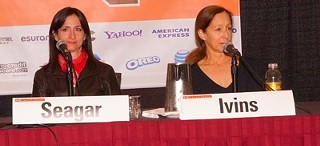Four Space Nerds Sitting Around Talking…
Space Tech After NASA: Boom Time for Innovation, or those were the days?
By Kate X Messer, 3:15PM, Wed. Mar. 13, 2013
OPEN IMAGE GALLERY

Having missed all the previous NASA @ SXSW sessions, I rushed over to the Omni to catch the last one, Space Tech After NASA: Boom Times for Innovation?.
First, the title had me. I'm a lifelong space/NASA geek, an Air Force brat who grew up a few hours south of Cape Kennedy and saw most of the Apollo and later space shuttle launches. At a very tender age, I saw how a good friend who barely survived a horrific car accident was saved by technology earned from the wisdom of space exploration. I saw firsthand what the space program brought to life on Earth.
Jeffrey Kluger, a Time magazine editor and the author of Apollo 13 lead the panel of four, which included Sara Seagar, MIT professor of Planetary Science; Marsha Ivins, retired NASA astronaut and veteran of five space shuttle missions; and Michael Griffin, past NASA admin man and current chairman and CEO of defense contractor Schafer Corporation.
As we sat waiting under the gigantic, seven-tiered crystal chandelier that seemed fit for the Titanic, I looked around the room noting other old or "analog" tech. I chuckled to myself watching one of the SXSW volunteers charging his cellphone in the wall and shook my head as I poured myself a glass of water. Why, in just moments, we'd learn about all of the new mod cons coming our way: Maybe there's a way to implant battery chargers in our forearms to provide juice to our personal appliances? Or heck, even an entire cell phone embedded under the dermis? I smiled wondering how modern technology would create an environment to draw moisture from the air so we'd no longer have to engage in pedestrian exercises like putting glass to lips for life-sustaining fluids.
Kluger introduced the panel. The four sat between projected images of a Time magazine collage of covers dedicated to space exploration. His first click to change the image brought up the browser window. He seemed a bit embarrassed. Pay no attention to that man behind the curtain! He'd intended to show a funny photo of Marsha Ivins' insane hairdo at zero-G. Finally, he got the image to appear. But not long after, the default Time mag collage replaced it and stayed up for the duration of the session.
After establishing the setting of post-space-shuttle-era NASA, Kluger posed: "Are we in boom time for innovation or the quiet horse latitudes" where nothing is really happening? Kluger's very eloquent if wordy and meandery prose morphed the question into another question that devolved into, what is, to many SX veterans, the very typical SXSW debate: public interests/control vs. private interests/control. "Do we need the monomaniacal focus of the NASA of the Sixties," he asked, or the anything-goes ethos of privatization? The rest of the session pretty much revolved around this debate like a lunar module in endless orbits searching for a safe place to land.
Each of the panelists made fairly predictable points, with the astronaut getting in the best zingers:
Academic Saegar, whose work centers around a project to mine asteroids, seemed to temper most of her excitement for innovation through the frame of funding or "motivation": "Three things motivate humanity," she said: "Fear, curiosity, and wealth." Motivation to get to the next level in space, she reasoned, must occur "or it's never going to happen. Is space going to open up if there is no motivation to make money?" She offered examples: private space telescopes, low-Earth trucking routes, and commercial satellites.
Administrator Griffin went back and forth a lot: "You'd have to look hard to find a more exciting time than the height of the Silicon Valley era. But you can't guarantee the success of the start-ups. On the other hand, when we entrust the mission to a government agency, we can expect a slow, cumbersome political" process. He spoke of the geopolitical motivations of NASA through the Eighties, "about swaying opinions of other nations in our favor," and used the example of the colonization of the New World to make the point that "We're creating opportunities for our descendants, not ourselves." He also pointed out the recent Gallop Polls indicate that Americans stand at 70% in favor of space exploration and believe that NASA gets (and deserves) a generous slice of our country's budget, unaware that the figure is less than half of 1%. The "average person thinks NASA is being taken care of. Most people don't know that it's not."
Astronaut Ivins pointed out that Americans spend more annually on pizza than the entire budget for space exploration. When asked if she'd more likely trust private or government agencies to launch her safely into space, she said, "Personally I wouldn't trust either." The so-called boom of private/commercial space flight is not actually innovating. "What they are building is nothing new. Nothing new except the acquisition programs." She emphasized that "it's not the tech so much as the way it's managed. The "best vehicle at the time of the shuttle program was exhaustively checked out, yet 14 people still died."
"Ignorance is bliss," she said. "until it isn't."
She still believes, however, that NASA should continue to be the implementer.
"Why not build a system to fix space stations in orbit? Currently, anything that breaks has to come home to be fixed. Then let's go to Mars. Other countries will beat us to it. Who will it be? When? Who's cool? Not the U.S. We'll probably end up doing their marketing."
As the only A/V (other than microphones) used in the session, the collage of Time covers loomed, I yearned to see visions of the future. Here we were, with some of the brightest minds on the planet, mired in the whirlpool of glory days while the U.S. space program gets lost in design-by-committee.
Griffin punctuated the glory days pall by recounting the energy of his younger years: "I went to grad school in the Seventies. And I asked my international student friends, 'Why did you come here?' 'Because you guys went to the moon!'" I couldn't help but think of a father in his 50s or 60s telling his kids how cool he was in his 20s.
At this point, I would have rather plopped these brilliant minds on a carpet with nothing but a room full of LEGOs (and no microphones) to see what they'd come up with.
While the panel pondered how to better "frame" and "motivate" people to support and get behind this noble cause, I couldn't help but wonder about this very session's missed opportunity. A couple of clicks into the NASA website, for example, or simply Googling the term "space tech" yields pages of info about all of the exponential leaps we as a country and we as humans have made due to space exploration. Isn't that enough motivation?
Kluger wrapped with a reminder that John F. Kennedy chose the word "choose" in his famous "We choose to go to the moon" speech. I agreed with his focus on that word, but wished he'd continued into the next line: "and do the other things, not because they are easy, but because they are hard, because that goal will serve to organize and measure the best of our energies and skills, because that challenge is one that we are willing to accept, one we are unwilling to postpone, and one which we intend to win, and the others, too."
A note to readers: Bold and uncensored, The Austin Chronicle has been Austin’s independent news source for over 40 years, expressing the community’s political and environmental concerns and supporting its active cultural scene. Now more than ever, we need your support to continue supplying Austin with independent, free press. If real news is important to you, please consider making a donation of $5, $10 or whatever you can afford, to help keep our journalism on stands.
Jordan Smith, March 11, 2014
Neha Aziz, Feb. 20, 2014
Aug. 26, 2021
SXSW, Apollo 13, NASA, Time magazine, Jeffrey Kluger, Marsha Ivins, Sara Saegar, Michael Griffin











